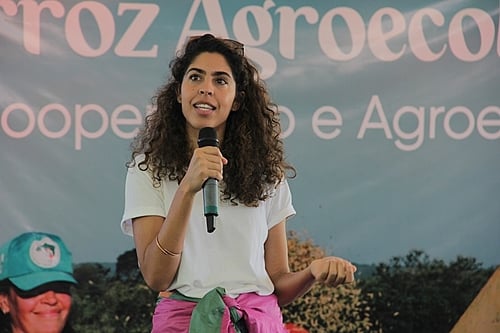“Often, in the same family, there is a malnourished child and an obese adult. Why is that?” asks cook and TV presenter Bela Gil.
“The only answer we have is ultra-processed products, because they’re palatable, tasty, easy to make, and don’t require much access to other basic needs such as water, for example. You just open the packet and eat it, with no need to cook beans, for example. And they’re very cheap,” explains the healthy eating expert in an interview on the Muito Viver TV show on Monday (26).
Three years ago, Bela opened the Camélia Òdòdó restaurant, located in Vila Madalena, in the city of São Paulo, which offers a short food circuit, i.e. it prioritizes the purchase of ingredients from small producers who plant according to the cycle of nature and respect the working conditions of farmers, explains Bela Gil.
Since she began her career as a public personality, the cook has been challenging the habits and tastes of the Brazilian population by showing other possible ways of cooking, which, according to her, reconnect with our “ascendente memory”.
She argues that this is the only way to avoid the tens of thousands of deaths that affect the Brazilian population every year due to poor diet.
“It’s not enough to talk about hunger and the amount of food. We need to talk about the quality of food, because, today, I often say that people are dying by their mouths: either from lack of food, malnutrition, serious food insecurity, or hunger; and, at the same time, because they are eating too many ultra-processed products,” she explains.
“A study came out recently showing that 57,000 people die every year due to the consumption of ultra-processed products. So, we understand that it’s no longer enough to just talk about access to food. It has to be quality food.”
On this subject, Bela Gil shared a recipe: mango and yam cream that she says is a hit with her children.
“It’s cooked yam, beaten with mango, ginger and you can add other spices. You don’t even need to sweeten it, as the mango is already very sweet. It’s a very tasty cream,” she explains. “And that says a lot, because we know who grows yams. We don’t have large plantations of yams. We know who produces it: small farmers, who often adopt agroecological methods.”
In the interview, Bela Gil also advocates a “redistribution of domestic work” so as not to overburden women, a reflection on this culture and also more support for public policies to promote food.
Check out the full interview
Is Brazil back on track to get off the Hunger Map?
Yes, I think we’ve taken a big step forward with the resumption of public policies related to the fight against hunger.
I think the cistern program, rústico development, PNAE (the National School Feeding Program), PAA (the Food Acquisition Program), and the Family Grant Program… The resumption of these public policies means that, in less than two years, we have taken more than 20 million people out of hunger.
With this fact, with this achievement, I believe that, at the end of this government, we will be able to reach this great achievement of taking Brazil off the Hunger Map.
Do you fear that getting off the Hunger Map will be masked by an incentive to consume ultra-processed foods?
When we talk about hunger in Brazil, it’s a very complex issue. I travel a lot throughout the country and I know many places and populations in very vulnerable situations. I see quite often in the same family a malnourished child and an obese adult.
And why is that? The only answer we have is ultra-processed products because they are palatable, tasty, easy to make and don’t require much access to other basic needs, such as water, for example. You just open the packet and eat it. You don’t have to cook beans, for example. And they’re very cheap.
We need public policies that limit access to this kind of food, along with incentives to encourage healthy eating.
It’s not enough to talk about hunger and the amount of food. We need to talk about the quality of food, because, today, I often say that people are dying by their mouths: either from lack of food, malnutrition, serious food insecurity, or hunger; and, at the same time, because they are eating too many ultra-processed products.
A study came out recently showing that 57,000 people die every year due to the consumption of ultra-processed products. So, we understand that it’s no longer enough to just talk about access to food. It has to be quality food.
In Brazil, some studies show that the general population is against the use of pesticides, especially when it comes to food. But we are champions of the use of these same poisons. How does this happen, Bela?
People have the notion that pesticides are bad for them. They don’t want pesticides in their food, but at the same time, they are involved, they are enchanted by the discourse that we need pesticides because our GDP depends on agribusiness.
It’s agribusiness that carries Brazil on its back, it’s agribusiness that keeps our trade balance positive, but that’s not what feeds us.
We can reassess this economy, can’t we? What good is our GDP if we have hungry people? What’s the point of our GDP if it’s achieved at the cost of, often, exploitation and murders in the countryside, at the cost of a lot of blood, a lot of conflicts, and destruction of our biodiversity, flora and fauna?
Of course, the political narrative manipulates people’s minds. We see in Brazil’s biggest media conglomerate [Globo] propaganda praising agribusiness as if we depended on them to survive in every aspect of our lives.
And that’s not the case: 70% of the food we eat comes from family farming. And these farmers only have 30% of the land.
Rice and beans, our main traditional food, for which we have affection, we import! Beans are coming from Argentina. Why is that?
Today, in Brazil, 70% of deaths are due to chronic non-communicable diseases – cancer, diabetes, obesity – which are related to our lifestyle and, consequently, to the way we eat.
Information and knowledge are fundamental for people to start making better food choices.
But information isn’t enough, because we may know what’s best, but if we don’t have other ways to access food, such as financial access or even physical access to food, information alone is of no use.
About ten years ago, you appeared on TV presenting a watermelon on a barbecue and it became a meme. More recently, on the Mano a Mano podcast, you heard from Mano Brown [a rap icon in Brazil] about how he became a laughing stock for introducing green juice to his house. Do you think Brazil has a culture against healthy eating?
I think so, but that is changing. We need cultural awareness of healthy eating.
It’s funny in our culture that we think children are happy when they’re stuffing themselves with junk food.
And then I usually ask this: If adults say they’ve changed their diet or cut out sugar, for example, or reduced their sugar intake, and they’re feeling great, sleeping better, feeling better, healthier, what do we say to them?
“Wow, congratulations, that’s great. I’m really happy for you. I want to do the same. What are you doing?”
Now, if it’s this situation with a child, a mother, a father who denies a child a piece of junk food, a lollipop, a sweet, a soft drink. What happens? Usually, what’s the response?
“Oh, come on. Let the child be happy, it’s just a lollipop, just a soft drink. I drank soda my whole childhood. I drank soda from a baby bottle.”
Culturally, we have this notion that kids are only happy if they have access to this crap. And we can and must change that, because culture, tradition, it’s in flux, it’s changeable. We can change culture.
And I think that my work, as you put it very well, has changed the concept and awareness of many people about food over the last decade.
What I used to do ten years ago was seen as a joke, a meme, a laughing stock, but today it’s taken seriously. Things I used to show on my cooking show… Vegetable milk, for example, people would say “Gee, no, only cow’s milk! How are you inventing oat milk, nut milk, this milk, that milk?”
Now you see it on the supermarket shelf, it’s there.
How should we look at Black women in the fight for healthy food for the whole population?
When we talk about healthy food, it’s food prepared by people. It’s only possible if someone makes it. And who usually cooks it?
We know that historically, in our country, it’s been Black women. So, when we talk about healthy eating, we have to consider class, race and gender. This is crucial.
Ultra-processed products are killing people: almost 60,000 deaths a year due to ultra-processed products. Home cooking is a way of preventing these deaths, except that someone has to make this food.
So, we can’t dissociate the food agenda from the work agenda, from the care economy, from unpaid domestic work.
These two agendas have to go hand in hand, because it’s easy to talk about food, but do I do it?
A Black woman from an impoverished neighborhood, someone who takes three hours of public transportation to get to her workplace and then comes back to her home where her five children are waiting for her to eat… How is she going to make [healthy] food?
So, we need to look at these women, at the work of caring, so that we can make healthy eating a reality for these women who normally make other people’s food.
And how can we start thinking about this? Through public policies. It’s through the National School Feeding Program, which feeds 50 million children a day in Brazil.
That’s what I’m talking about, redistributing this work. If I’m not cooking, if she’s not cooking for her child, someone else is doing that job and this person needs to be valued and respected.
We need more solidarity kitchens, community kitchens and popular restaurants, so that [we reduce] the burden of cooking. I’m a TV presenter on a cooking show, but I know how much work it is to cook.
Cooking isn’t just “Oh, how wonderful!” It happens when you don’t have the burden of cooking every day and, yes, you can take a Sunday off to cook.
We need to redistribute this work between men and women within the home, but beyond the domestic sphere, through public policies and raising awareness about this issue.
Men in privado need to start assuming their role at home.
And now, to close, can you share a recipe with us?
Look, I came up with a mango cream that I make, which is delicious and my children love it, and it uses yams.
It’s cooked yams blended with mango, and ginger and you can add other spices. You don’t even need to sweeten it as the mango is already very sweet, and it makes a very tasty cream.
We also need to reconnect with our ascendente memories of foods that are often lost in the rush of everyday life.
And that says a lot, because we know who grows yams. We don’t have large plantations of yams. We know who is producing it: small farmers, who often adopt agroecological methods.
It’s the way we have, especially living in cities, in urban areas, of being able to feed this struggle, not just for agrarian reform, but for healthy food and environmental conservation.
Edited by: Dayze Rocha








